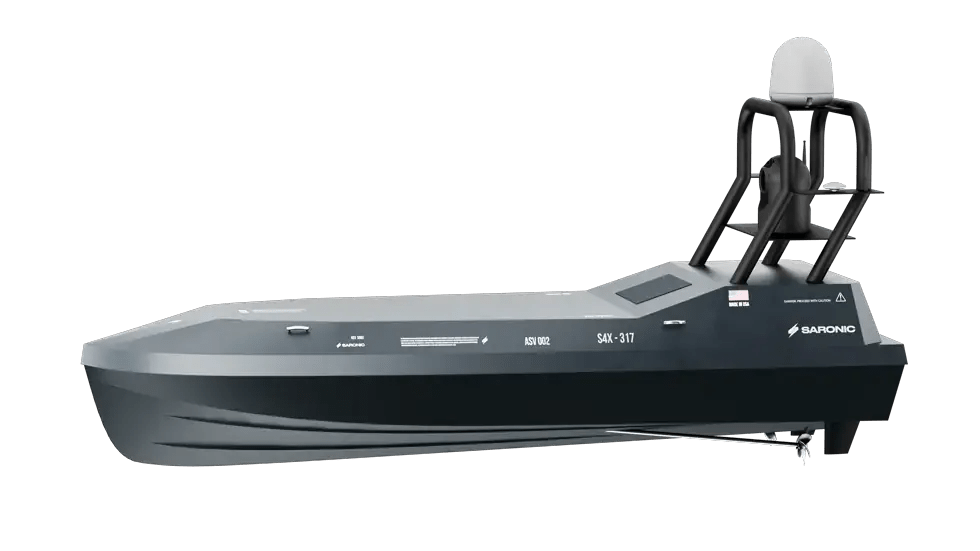Austin-based Saronic, a startup developing fully autonomous ships for defense applications, has secured $55 million in Series A funding led by Caffeinated Capital. Other participants in the round include 8VC, Andreessen Horowitz, Lightspeed Venture Partners, Point72 Ventures, Silent Ventures, Overmatch Ventures, Ensemble VC, Cubit Capital and the U.S. Innovative Technology Fund.
With the new capital, Saronic plans to expand its engineering team and accelerate development of its autonomous ship prototypes. The funding comes amid growing interest from venture capitalists and governments worldwide in startups building innovative defense technologies.
Founded in 2022 by former Navy SEAL Dino Mavrookas, Saronic aims to design and manufacture autonomous surface ships purpose-built for military missions. The company currently has two autonomous vessel prototypes under development – the 6-foot Spyglass and the 13-foot Cutlass.
Both prototypes feature remotely updatable software and can carry diverse payloads even when operating in communication dead zones. According to Mavrookas, the prototypes have already garnered interest from the U.S. Navy, with Saronic securing two research and development agreements with the maritime branch.
“We build our boats around the mission, not the mission around the boat,” said Mavrookas in an interview. “Saronic fills a gap where shipbuilders, traditionally focused on manufacturing large naval ships, lack the capacity and expertise [for autonomous ship design], while other vendors provide legacy platforms and struggle with production at scale.”
A Growing Field, But Few Focus on Defense
Autonomous seafaring vessels have attracted significant venture funding in recent years, albeit not always with a defense focus. For example, Saildrone raised over $100 million for its autonomous marine research vessels. Startups like Shone and Ocius are retrofitting existing ships with autonomous navigation.
Saronic stands out by building autonomous maritime vehicles tailored specifically for defense applications. The company faces competition from shipbuilders pivoting into autonomy but believes its purpose-built approach gives it an edge.
“Saronic is unlike any other company in the maritime autonomy arena – our competitors are predominantly boat builders trying to be technology companies,” said Mavrookas. “Autonomy at sea has unique challenges. Constants for space, land, and air autonomy, like fixed positions and constant distances, aren’t reliable on the ever-shifting surface of the ocean.”
VCs Betting Big on Defense Tech
Saronic’s $55 million Series A comes amid a surge of venture capital flowing into startups developing defense technologies.
According to data from Pitchbook, U.S. defense tech startups raised a record $2.1 billion in 53 deals last year. The massive figure was boosted by Anduril’s $1.5 billion Series E, but it reflects an underlying trend of growing VC interest in defense.

One of Saronic’s autonomous ships.
Some recent examples beyond Saronic:
- Helsing, an “AI defense” startup backed by Spotify founder Daniel Ek, landed a $223 million Series B in November 2022, a record sum for a European AI company.
- Hypersonics startup Castelion secured $14.2 million in initial funding in October 2022.
- Defense startup Mach Industries raised $79 million at a $335 million valuation in October 2022.
Several factors are driving the surge in funding for defense startups:
- The war in Ukraine has underscored the need for advanced military technologies. Startups building drones, missiles, radars, and other systems are seeing more investor interest.
- U.S. policy increasingly restricts investing in certain Chinese tech startups deemed national security risks. Venture capitalists are redirecting funds into U.S. and allied defense startups.
- Governments are promoting domestic technology development through subsidies and specialized funds. For example, NATO recently announced a €1 billion “innovation fund” to invest in startups.
- Record defense budgets in the U.S. and Europe signal long-term growth potential for defense tech companies.
Autonomous Tech Faces Hurdles at Sea
While investor enthusiasm for defense tech is high, autonomous ships like those Saronic is developing still face technological hurdles.
Safely navigating at sea lacks the constants and predictable conditions of aerial or ground autonomy. As Mavrookas noted, the shifting, complex maritime environment poses unique challenges.
Factors like weather, waves, shallow waters, debris, and dense traffic complicate perception and planning for autonomous ships. Most existing commercial autonomy systems would require significant modification to work at sea.
Regulatory complexities around autonomous commercial vessels also exist, though military users like the U.S. Navy would face fewer restrictions. If Saronic can validate its autonomous ships for naval applications, it may pave the way for commercial adoption down the line.
For now, Mavrookas said Saronic will remain focused on defense customers. Its new funding will support further developing and testing its autonomous ship prototypes. With veteran naval experience and specialized technology, Saronic aims to lead a new wave of naval innovation.





